Words: Celina Wong
Photos: Delanie Tucker
Although it feels early, students are preparing their schedules for the next school year. Many students opt to take Advanced Placement (AP) classes, which prepare them for the notorious AP tests in the first weeks of May. Centennial offers a wide variety of these courses ranging from AP Comparative Government and Politics to AP Chinese IV Language and Culture. Even though these courses allow for students to skip some general education classes in college, AP courses teach at a faster pace and hold its students to a much higher standard. AP classes are highly coveted, but the question is: how many is too many?
Senior Binderiya Undrakhbold has taken 11 AP classes throughout her four years at Centennial. Through her experience, she doesn’t think there is a set number of APs a student should take.
“If you enjoy pushing yourself and have an interest in a lot of different things, I think students should be able to take as many as they want,” Undrakhbold said.
However, Undrakhbold does believe there is a direct correlation between the AP workload and home life.
“At Centennial, AP Chemistry and AP Calculus BC are two of the hardest classes offered,” Undrakhbold explained. “Students definitely need to put in their own time and hard work to succeed in those classes because at the end of the day, they are college-level courses.”
Undrakhbold proposes that students should not base their course registration on their peers; rather, they should choose the ones that spark interest.
“Take AP classes that you feel the most interested in. Take classes that you know you will enjoy, not just because everyone around you is,” Undrakhbold advised. “I currently take AP Human Geography and I love the documentaries we watch in class and I’m really glad I’m taking it.”
Undrakhbold suggests that students should branch out and find different study methods when preparing for these classes.
“I think students should experiment in different ways of studying,” Undrakhbold stated. “A lot of us think and feel that there is only one way of studying, which is reading the textbooks, taking notes, and memorizing it. But, there are so many other efficient ways to retain information and prepare for tests.”
Jennifer McKechnie, the Intermediate Team Leader (ITL) of student services at Centennial High School, has a similar point of view to Undrakhbold about the number of AP classes a student should take.
“I would say it really depends on the student,” McKechnie said. “Every student is unique and every student is going to have their individual needs based on what they are interested in, what they are good at, and what their career goals are. I don’t think there is one set model or one set number.”
McKechnie detailed a few benefits of taking these higher level courses.

“I think [AP classes] prepare students for collegiate level work and the rigor that is expected at the college level. Students are also getting exposure and the chance to explore that topic in an in-depth level,” McKechnie explained.
While the academic benefits are great, there is a great deal of stress attached to these courses.
“The stress comes in when a student is taking multiple, or way too many AP classes,” McKechnie stated. “[To limit stress], one of the things we can do is connect students with tutors. We can also look at how overwhelming the classes may be. If it is towards the beginning of the school year, we look at reducing the workload by, maybe, going down to an honors level class.”
According to McKechnie, students should not feel obligated to take AP level courses because it is the norm, or to fit in with their friends and classmates.
“I think there is a lot of pressure in this building to take everything at an AP or [gifted and talented] level, so we want to explain to students ‘It’s okay, you don’t have to do everything at an AP level,’” McKechnie added. “Do the classes you are good at, and the ones that you love, at a higher level. You don’t have to do everything.”
McKechnie also mentioned that AP classes are not mandatory and that students can still be successful without them.
“Kids get into Harvard and really good colleges without having several AP classes on their transcripts,” McKechnie said.
McKechnie provided some advice to help these students avoid stress and to become more well-rounded.
“I think students should have something outside of academics, so they are not overtaxed with a lot of APs,” McKechnie shared. “Students should give themselves time to participate in other things like clubs and sports because colleges will look at that as well.”
Ellen Mauser, another guidance counselor at Centennial High School, detailed what she thinks is essential in order to maintain a healthy school life.
“I’ve been stressing balance [to students]. I think that is key for student well-being,” Mauser added. “If they can find balance within their schedule, they have less of a chance to be anxious and stressed.”
Advanced Placement classes have their pros and cons. Although APs can prepare students for the college world and allow incoming freshmen to jump into their desired majors, they can potentially cause more stress and impact the work and school balance. Because there is not one set number of APs someone should take, students can experiment in different courses to see where their interests lie and even consider taking certain classes at a higher level. The question may not be, “how many APs is too many?” rather: “what is the right amount for me?”
To read this article in the March print issue click here.
For more breaking news and photos, follow The Wingspan on Instagram and Twitter @CHSWingspan.





